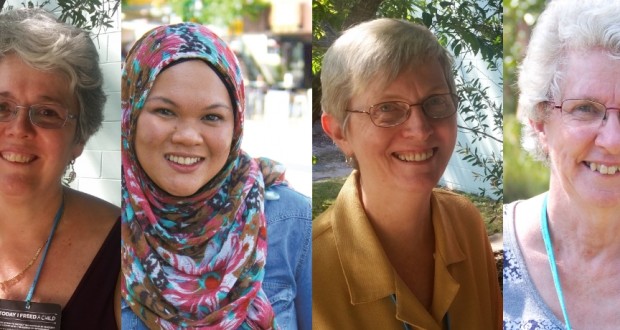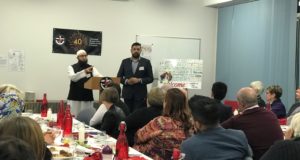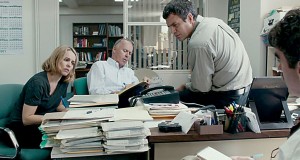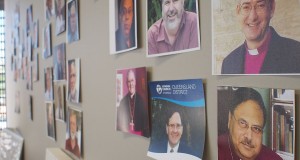Since the activities of the so-called Islamic State have made the news, anti-Muslim sentiment in Australia has been at an all-time high. Rohan Salmond speaks to some interfaith activists working to build understanding across religious lines.
A black silhouette wielding a knife stands over a man kneeling in an orange jumpsuit. It’s an image so powerful it has reached around the world, affecting not only the cultural and political landscape, but our relationships with each other.
This particular image, a still from a video of a man from the so-called Islamic State beheading journalist James Foley, has renewed the climate of hysteria around Muslims in Australia. In the weeks following the video’s release Muslim women were physically assaulted in public and a threat was made to decapitate an olive-skinned man on the Gold Coast who was mistaken for a Muslim because of his beard.
“A climate of fear can so easily be whipped up in our society,” says Queensland Synod Interfaith Relationships Committee Secretary Rev Heather Griffin. “It’s just wrong to demonise another person without having gone to the trouble of even getting to know them. That’s not the way Jesus acted.”
A defining moment
Heather’s passion for interfaith work came after the September 11 attacks in 2001. “I was in my first placement at St David’s Holland Park [Brisbane] and the manse was about half a block from the Holland Park mosque,” she says. “I heard about the attempted petrol bombing of the Holland Park mosque as well as the burning down of the Currawong mosque and I thought Christians in the local area need to say that this behaviour is just not acceptable … Then I thought we needed to start building more relationships between Christians and Muslims.”
The September 11 attacks motivated another interfaith activist to build bridges. Australian Muslim Advocates for the Rights of All Humanity (AMARAH) Chairperson Dr Nora Amath was inspired when she and her neighbours (Anglicans, Catholics and Greek Orthodox) fostered an interfaith community between their families by declining to erect fences between their homes.
“[All our] kids would just jump from backyard to backyard and they only came home when you were yelling out their names to come for dinner, and even then they would say ‘Well we’re eating here now’,” she says.
“September 11 happened five months later. I thought that even though we had created these really close relationships with our neighbours surely that relationship cannot withstand what’s out there in the media with Muslims being the bogey man. But you know the fences didn’t go up, in fact our neighbours became our greatest supporters.
“I was so inspired by that and thought this is what it takes to see beyond all that hate and ugliness out there. You really see the beauty of each other when you start forming real relationships—not just acquaintances but real relationships.”
Although a busy academic with a young family, Nora has been involved in interfaith work for many years. She worked by herself for five years running public information sessions on Islam before collaborating with Christian social justice activist Dave Andrews in 2007.
It’s about who you know
Emerald Uniting Church, over 270 km west of Rockhampton, is working to build relationships with their Muslim neighbours.
Emerald Uniting member Philippa Core says, “The Muslim community isn’t very big in Emerald but there are Muslim children in the schools and there are Muslim families within the community.”
There is no mosque in Emerald, so local Muslims asked the minister Rev Suzy Sitton if they could worship in the church hall.
Suzy says, “They were going to meet in another site and unfortunately the parish council of that particular place got up in arms and they were no longer welcome, so they came to us … I wrote in our newsletter and shared my own personal experience of knowing Muslim people and having Muslim friends, and the congregation decided we could open our doors.
“It’s a continual relationship that’s growing. We have only had 12 months of this sharing time. I sometimes have coffee with them after their service.”
Nora Amath says a cup of tea or coffee is all it takes to get interfaith relationships to grow.
“Usually it’s really simple. If there’s a mosque nearby, it’s simply sending an invite. It’s really important that it goes beyond the leadership, beyond academic interfaith dialogue, otherwise it’s just a talkfest and there’s no real friendship. But it’s great if church doors are open, saying to Muslims, ‘Please come and have a cup of tea with us’.
“Just start showing hospitality and get to know each other as neighbours. Start off with things you have in common. If you need something to talk about, talk about the concept of neighbours! What it means to be a good neighbour from both faith traditions. Both have very rich traditions when it comes to being a neighbour.”
Heather Griffin agrees. “Sharing hospitality is the big thing. What you share over a meal, what you share in friendship can then lead on to other discussions and so on. It’s the building of friendships that’s important.”
Building friendships with people who are different to you is a lot of work. If we believe the Bible and Christian tradition is true, why talk to people of other faiths? Heather says this approach puts limits on God.
“We like to think we are right and everyone else is wrong,” says Heather, “but God speaks to us in a whole variety of ways. There is an awful lot we miss if we decide God is only going to speak to us in a certain way, through a specific channel, but God is reaching out to us saying, ‘Here, I have this wonderful enriching gift for you!’
“The whole [interfaith] journey has enhanced my Christian faith, not diminished it … because as you talk about things you say, ‘Golly I’ve never looked at the issue from that perspective before! What should the Christian perspective be on that?’ And you actually go and you look at it again. It’s very enriching.”
Nora has the same approach.
“One of my favourite verses in the Qur’an is in Surah Al-Hujurat when God talks about how from Adam and Eve God created many tribes so that they may know one another, not so that they may despise one another. This word ‘know’ is a very passionate ‘know’, a very active ‘know’. It means to almost embrace that person.
“This is really God’s wisdom and God’s plan to make us different so we do engage with one another. I’m very inspired by that.”
Blessed are the peacemakers
“Unfortunately the media pits Muslims and Christians against one another,” says Nora, “but it doesn’t have to be like that. Muslims and Christians have been cooperating since the origins of Islam. Muhammad received counsel from a Christian monk throughout his life.
“I think that as we get to the root of all religious faith and if people just start engaging and talking with one another they would really see so much commonality. The commonality is really based on this concept of compassion. For example in Islam every chapter of the Qur’an starts off with ‘In the name of God, the most gracious and compassionate’. Before I eat, before I drink, before I do anything I say this, because I am supposed to be an embodiment of love and compassion myself.
“If there’s anything that’s really just changed me as a person, it’s knowing the beatitudes. That’s what it’s all about. It’s the theme for service and life and I go around telling everybody. I have it on my fridge. I just think it’s so poignant. It’s exactly what life should be,” says Nora.
Heather says, “The beatitudes don’t just say ‘Blessed are the peacemakers who happen to be Christian’. Blessed are the peacemakers—full stop!”
 JourneyOnline
JourneyOnline







